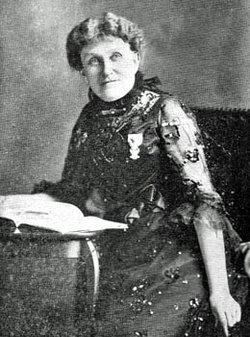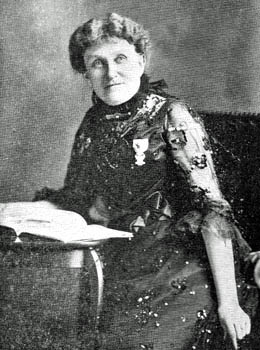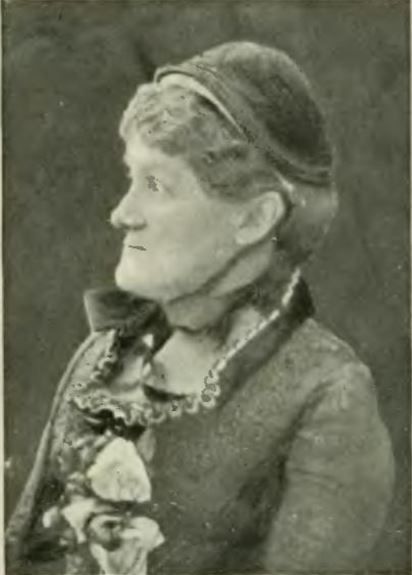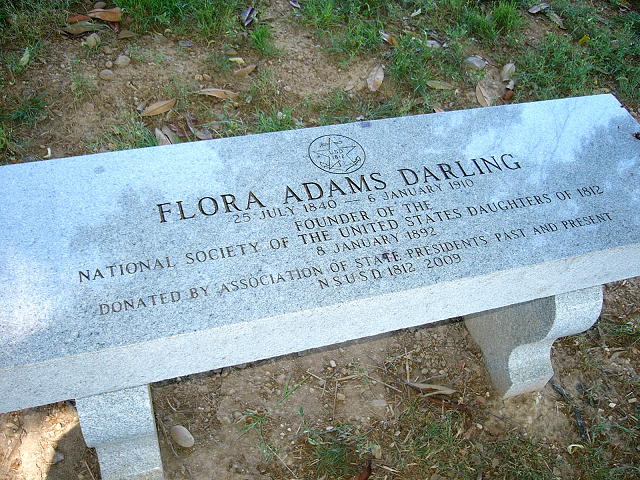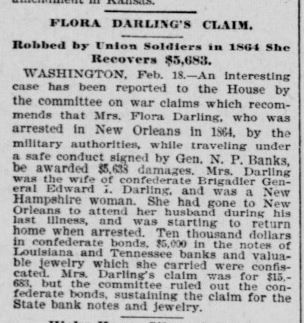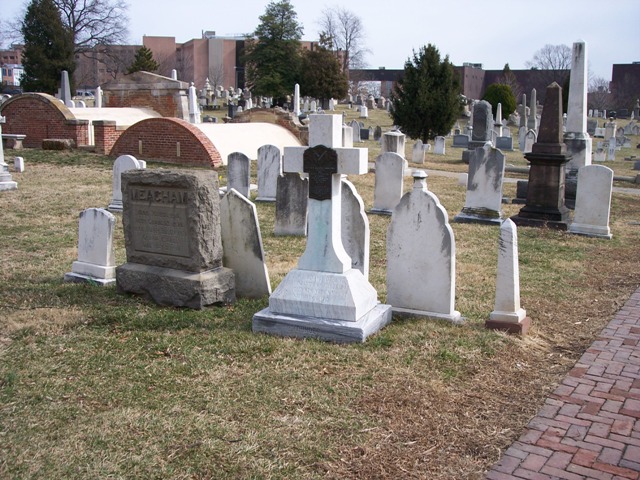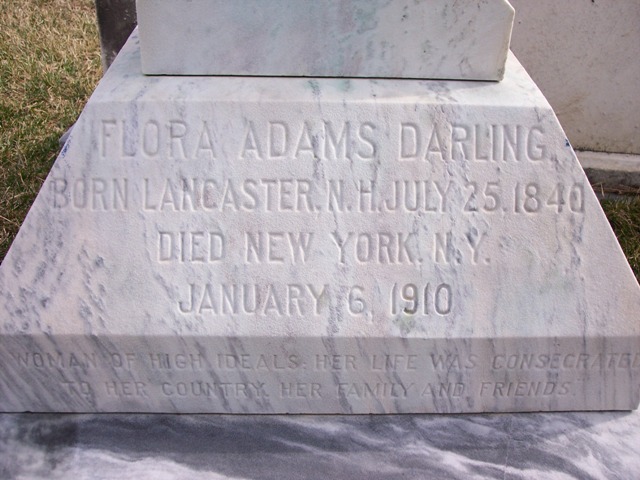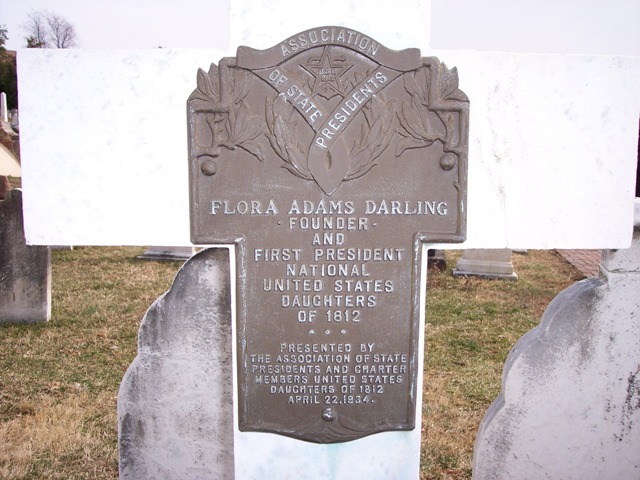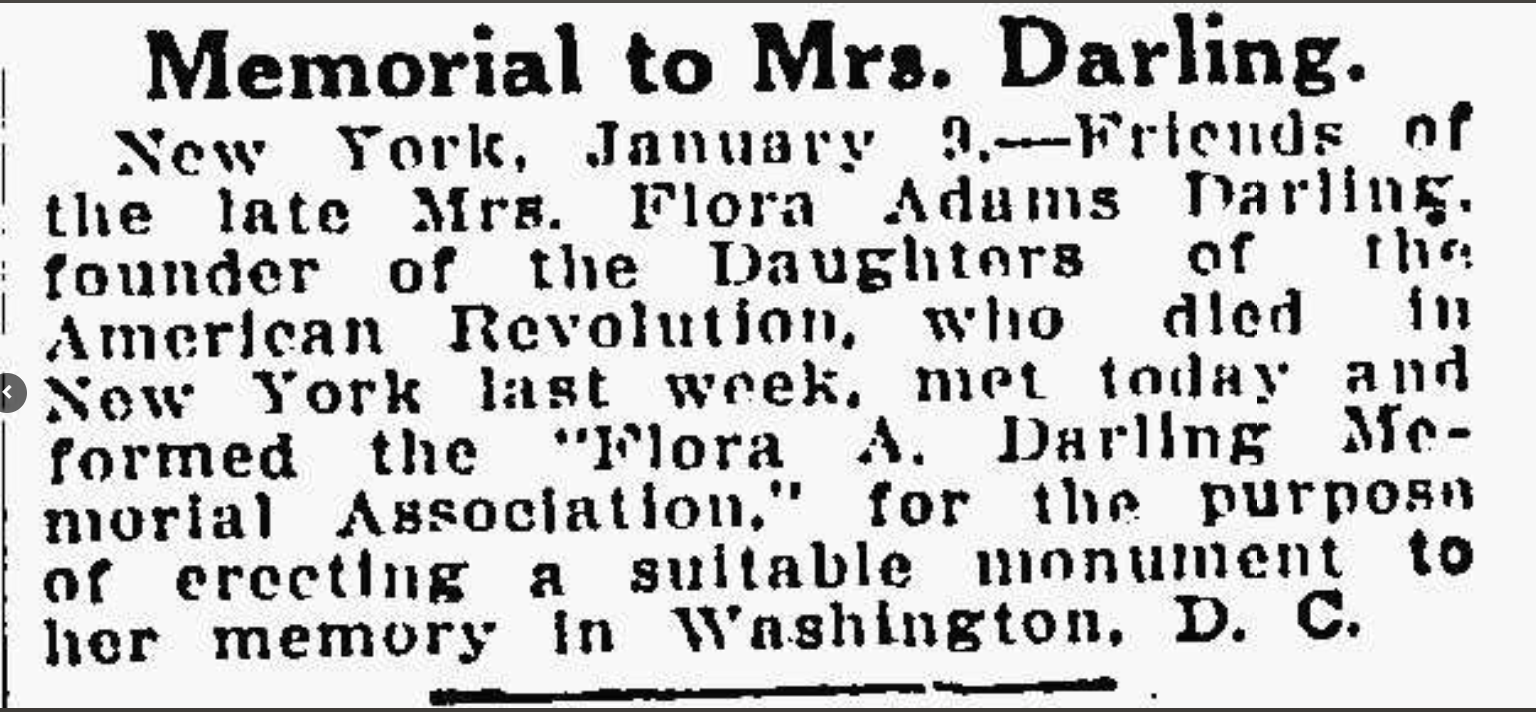The Evening Star, January 6, 1910
Mrs. Darling Dead D.A.R. Founder Expires Suddenly in New York. Resident of Washington -- About to Start for Home Here When Summons Came
Was Seventy Years Old -- Was One of the Organizers of the Original Society formed in This City, New York, January 6 –
Mrs. Flora Adams Darling, a founder of the society of the
Daughters of the American Revolution, and the Society of the Daughters of the War of 1812, died this morning, at 9 o'clock, from apoplexy, at the home of her brother, John Quincy Adams, at 153 West 117th street. She was seventy years old.
Mrs. Darling was just starting for Washington. A cab had been summoned and when it reached the door she rose to go out, but was seized with a stroke of apoplexy, when she reached the hall. Dr. Lombard of Graham Court, the family physician was sent for. When he reached the house Mrs. Darling had already died. Mr. Adams, her brother was going to accompany her to Washington.
Mrs. Darling will be buried at Lancaster, N.H., Saturday or Sunday.
She was the widow of Gen. Edward Irving Darling of the southern Confederacy, who was killed in the civil war. She is survived by two grandchildren, Charles Tiernon Darling and Nancy Darling of Washington.
Dictionary of American Biography
DARLING, FLORA ADAMS (Mrs.), authoress, was born at Lancaster, Coos County, N.H., July 25, 1840, daughter of Harvey and Nancy Dustin (Rowell) Adams. She is of most distinguished ancestry; Henry Sampson, who came over in the Mayflower, and Henry Adams were her first ancestors to come to America.
In England and Scotland her ancestors included many famous personages. In 1895 Westminster College, of Maryland conferred upon her the degree of A.M. She was the founder and first vice-president and general director of the Daughters of the American Revolution, and for her services in organizing the society, was made an honorary life member. She resigned, however, in 1891. She is also founder of the United States Daughters of 1812, and president of the Edward Irving Darling Musical Society, founded in memory of her son, an American composer. She is also vice-president of the Lamperti School of Music. She is author of Mrs. Darling's Letters, or Memories of the Civil War; A Social Diplomat; Founding of the D.A.R and D.R. Societies; Senator Athens, C.S.A.; A Wayward Winning Woman; Was It A Just Verdict? Memories of Virginia (1907), etc. She is a benefactoress of William and Mary College; presented to the State of Mississippi a portrait of Jefferson Davis; in memory of her son, gave a magnificent painting of the Crucifixion to the Church of St. Peter, Mt. Clemens, Mich. Mrs. Darling is a member of the American Society of Authors, and, in religion, a Roman Catholic. On March 15, 1859, she married Edward L. Darling, later General in the Confederate Army. Residence: 1907 N Street, N.W. [American Biographical Directory 1908-1909]
DARLING, Mrs. Flora Adams, novelist, born in Lancaster, N. H., in 1840. She is a member of the well-known Adams family, and inherits many traits of her ancestors. At an early age she became the wife of Col. Edward Irving Darling, a southerner, and they made their home in Louisiana. When the Civil War broke out, Colonel Darling went into the Confederate army. He was killed during the war, and Mrs. Darling was left a widow with one son, Edward Irving Darling, the musical composer. Mrs. Darling began to write industriously, and her works have brought her both fame and other rewards. She is the author of a number of books, the chief of which is "Mrs. Darling's Letters, or Memories of the Civil War" (1884). That book was written at the suggestion of Judge E. P. Norton, of New York City, who was her counsel in the "celebrated case" known as the Darling Claim, long pending in Congress and finally reaching the Court of Claims. That claim is founded on the fact that, while in custody of the New Orleans officials, her trunks were robbed of a casket of jewels and $25,000 worth of gold-bearing cotton bonds, that she never recovered, the authorities protesting that they were powerless to act upon the case. Mrs. Darling, after her return north, called on President Lincoln and stated her case, which he recognized as a just one, and manifested his intention to see it righted. His untimely death prevented, and for the past twenty years it has been in litigation, supported by eminent counsel, who have no doubt that she will ultimately succeed in recovering not only principal and interest, but compensation for the hardships to which she was subjected. Losing her means through unfortunate investments, she was for a long time seriously ill, and her illness resulted in deafness and impaired vision. After recovering, she resumed her literary work, contributing to magazines and periodicals. Her books are "Mrs. Darling's Letters," "A Wayward Winning Woman" (1890), "The Bourbon Lily" (1890), "Was it a Just Verdict?" (1890), "A Social Diplomat" (1891), "From Two Points of View" (1892), and "The Senator's Daughter" (1892). Her short stories are numerous. During the Civil War she was an intimate friend of Jefferson Davis and his family, and the acquaintance deepened into lifelong friendship. She assisted Mrs. Davis in collecting materials for the "Life of Jefferson Davis." For that purpose Mrs. Darling made a thorough examination of the official records of the War Department in Washington, D. C. One of her most notable achievements is the organization of the society called "The Daughters of the Revolution," which she served as historian. The aims and purposes of the society are purely patriotic, and it intends to perpetuate the memories of the men and women who achieved or helped to achieve American Independence in the Revolution of 1776, by the acquisition or protection of historic spots and their indication by means of permanent tablets or monuments; to encourage historical research in relation to the American Revolution, and to publish the results; to cherish, maintain and extend the institutions of American freedom, to foster true patriotism and love of country, and to aid in securing for mankind all the blessings of liberty; and to aid in the work of inducing the United States Government to gather, compile and publish the authentic records of every officer, soldier, sailor, statesman or civilian who contributed to the cause of American Independence in the War of 1776. Recently she has edited the "Adams Magazine," published by her nephew, Francis A Adams, which is the organ of the society. Mrs. Darling has received the college degrees of A M. and A. B. in recognition of her literary work.
The Evening Star, January 6, 1910
Mrs. Darling Dead D.A.R. Founder Expires Suddenly in New York. Resident of Washington -- About to Start for Home Here When Summons Came
Was Seventy Years Old -- Was One of the Organizers of the Original Society formed in This City, New York, January 6 –
Mrs. Flora Adams Darling, a founder of the society of the
Daughters of the American Revolution, and the Society of the Daughters of the War of 1812, died this morning, at 9 o'clock, from apoplexy, at the home of her brother, John Quincy Adams, at 153 West 117th street. She was seventy years old.
Mrs. Darling was just starting for Washington. A cab had been summoned and when it reached the door she rose to go out, but was seized with a stroke of apoplexy, when she reached the hall. Dr. Lombard of Graham Court, the family physician was sent for. When he reached the house Mrs. Darling had already died. Mr. Adams, her brother was going to accompany her to Washington.
Mrs. Darling will be buried at Lancaster, N.H., Saturday or Sunday.
She was the widow of Gen. Edward Irving Darling of the southern Confederacy, who was killed in the civil war. She is survived by two grandchildren, Charles Tiernon Darling and Nancy Darling of Washington.
Dictionary of American Biography
DARLING, FLORA ADAMS (Mrs.), authoress, was born at Lancaster, Coos County, N.H., July 25, 1840, daughter of Harvey and Nancy Dustin (Rowell) Adams. She is of most distinguished ancestry; Henry Sampson, who came over in the Mayflower, and Henry Adams were her first ancestors to come to America.
In England and Scotland her ancestors included many famous personages. In 1895 Westminster College, of Maryland conferred upon her the degree of A.M. She was the founder and first vice-president and general director of the Daughters of the American Revolution, and for her services in organizing the society, was made an honorary life member. She resigned, however, in 1891. She is also founder of the United States Daughters of 1812, and president of the Edward Irving Darling Musical Society, founded in memory of her son, an American composer. She is also vice-president of the Lamperti School of Music. She is author of Mrs. Darling's Letters, or Memories of the Civil War; A Social Diplomat; Founding of the D.A.R and D.R. Societies; Senator Athens, C.S.A.; A Wayward Winning Woman; Was It A Just Verdict? Memories of Virginia (1907), etc. She is a benefactoress of William and Mary College; presented to the State of Mississippi a portrait of Jefferson Davis; in memory of her son, gave a magnificent painting of the Crucifixion to the Church of St. Peter, Mt. Clemens, Mich. Mrs. Darling is a member of the American Society of Authors, and, in religion, a Roman Catholic. On March 15, 1859, she married Edward L. Darling, later General in the Confederate Army. Residence: 1907 N Street, N.W. [American Biographical Directory 1908-1909]
DARLING, Mrs. Flora Adams, novelist, born in Lancaster, N. H., in 1840. She is a member of the well-known Adams family, and inherits many traits of her ancestors. At an early age she became the wife of Col. Edward Irving Darling, a southerner, and they made their home in Louisiana. When the Civil War broke out, Colonel Darling went into the Confederate army. He was killed during the war, and Mrs. Darling was left a widow with one son, Edward Irving Darling, the musical composer. Mrs. Darling began to write industriously, and her works have brought her both fame and other rewards. She is the author of a number of books, the chief of which is "Mrs. Darling's Letters, or Memories of the Civil War" (1884). That book was written at the suggestion of Judge E. P. Norton, of New York City, who was her counsel in the "celebrated case" known as the Darling Claim, long pending in Congress and finally reaching the Court of Claims. That claim is founded on the fact that, while in custody of the New Orleans officials, her trunks were robbed of a casket of jewels and $25,000 worth of gold-bearing cotton bonds, that she never recovered, the authorities protesting that they were powerless to act upon the case. Mrs. Darling, after her return north, called on President Lincoln and stated her case, which he recognized as a just one, and manifested his intention to see it righted. His untimely death prevented, and for the past twenty years it has been in litigation, supported by eminent counsel, who have no doubt that she will ultimately succeed in recovering not only principal and interest, but compensation for the hardships to which she was subjected. Losing her means through unfortunate investments, she was for a long time seriously ill, and her illness resulted in deafness and impaired vision. After recovering, she resumed her literary work, contributing to magazines and periodicals. Her books are "Mrs. Darling's Letters," "A Wayward Winning Woman" (1890), "The Bourbon Lily" (1890), "Was it a Just Verdict?" (1890), "A Social Diplomat" (1891), "From Two Points of View" (1892), and "The Senator's Daughter" (1892). Her short stories are numerous. During the Civil War she was an intimate friend of Jefferson Davis and his family, and the acquaintance deepened into lifelong friendship. She assisted Mrs. Davis in collecting materials for the "Life of Jefferson Davis." For that purpose Mrs. Darling made a thorough examination of the official records of the War Department in Washington, D. C. One of her most notable achievements is the organization of the society called "The Daughters of the Revolution," which she served as historian. The aims and purposes of the society are purely patriotic, and it intends to perpetuate the memories of the men and women who achieved or helped to achieve American Independence in the Revolution of 1776, by the acquisition or protection of historic spots and their indication by means of permanent tablets or monuments; to encourage historical research in relation to the American Revolution, and to publish the results; to cherish, maintain and extend the institutions of American freedom, to foster true patriotism and love of country, and to aid in securing for mankind all the blessings of liberty; and to aid in the work of inducing the United States Government to gather, compile and publish the authentic records of every officer, soldier, sailor, statesman or civilian who contributed to the cause of American Independence in the War of 1776. Recently she has edited the "Adams Magazine," published by her nephew, Francis A Adams, which is the organ of the society. Mrs. Darling has received the college degrees of A M. and A. B. in recognition of her literary work.
Family Members
Sponsored by Ancestry
Advertisement
Explore more
Sponsored by Ancestry
Advertisement
